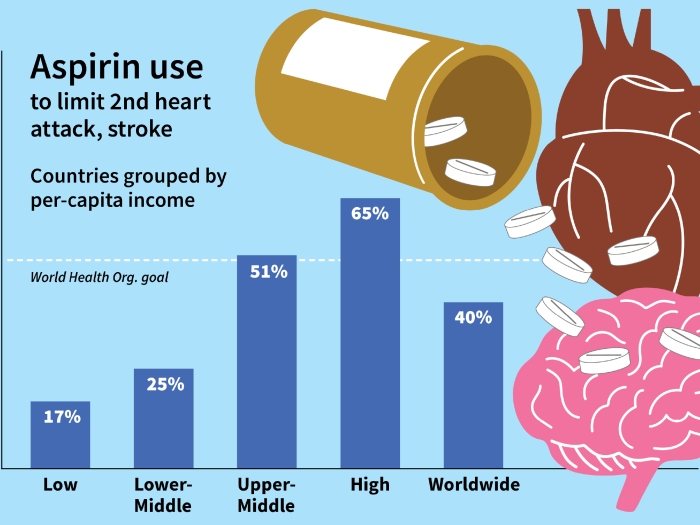A new paper identifies strategies that providers might use to help their patients better balance the risks and benefits of anticoagulants.
7:00 AM
Author |

For some patients on blood thinners, gastrointestinal bleeding caused by those medications is an adverse event that can be disabling or even fatal.
New research highlights two strategies to potentially reduce the risk.
Some patients are simply taking too many blood-thinning drugs that increase their bleeding risk, while others could start another medication to reduce the risk of gastrointestinal bleeding, Michigan Medicine investigators say.
LISTEN UP: Add the new Michigan Medicine News Break to your Alexa-enabled device, or subscribe to our daily audio updates on iTunes, Google Play and Stitcher.
And those takeaways build on previous research that shows the use of just one low-dose anticoagulant already nearly doubles the risk of upper gastrointestinal bleeding.
"Anticoagulation strategy is all about the balance between preventing blood clots and reducing the risk of bleeding complications," says senior author Geoffrey Barnes, M.D., M.Sc., a vascular cardiologist at the University of Michigan Frankel Cardiovascular Center and an assistant professor of internal medicine at the U-M Medical School.
SEE ALSO: More Than One-Third of Patients Risk Major Bleeding By Doubling Up on Blood Thinners
Barnes and other researchers studied 6,907 patients who started using the popular anticoagulant warfarin (also known as Coumadin or Jantoven), between 2011 and 2018, and went to a clinic as part of the Michigan Anticoagulation Quality Improvement Initiative — a multicenter quality improvement collaborative of anticoagulation clinics across the state sponsored by Blue Cross Blue Shield of Michigan.
Nearly half faced an avoidable danger: Forty-five percent of the patients on warfarin were also using anti-platelet therapy such as aspirin, which increases the risk of bleeding.
"Overall, 36 percent of the patients in our study could benefit from one or both of the strategies we present to reduce the risk of GI bleeding," Barnes says.
The research was published in Vascular Medicine.
Doubling up on blood thinners
Patients in this study were most likely to take blood thinners for venous thromboembolism, which is a blood clot in a vein, or to prevent a stroke due to existing atrial fibrillation.
But the use of two blood antithrombotics might be increasing some patients' risks of GI hemorrhage without further reducing their risk of having a stroke, researchers say.
MORE FROM MICHIGAN: Sign up for our weekly newsletter
"Many patients may not need to take a medication like aspirin if they're already taking warfarin," Barnes says. "We couldn't find a reason for the second anticoagulant for about 30 percent of the high-risk patients who were on multiple blood thinners. These patients may be able to reduce their risk of GI bleeding simply by stopping one of their blood thinners."
Some appropriate indications for adding anti-platelet therapy to prevent blood clots in patients already taking warfarin, researchers say, include a recent history of coronary artery disease or heart attack, peripheral arterial disease, coronary artery stents, bypass surgery, stroke or mini-stroke (TIA), or an autoimmune disorder called anti-phospholipid antibody syndrome.
Adding gastroprotection
What about patients that actually do need to take multiple blood thinners, such as warfarin and clopidogrel?
Researchers cite a decade-old expert consensus that recommends something just a minority of clinicians are doing: adding a proton pump inhibitor such as omeprazole (also known as Prilosec) to help suppress acid production in the stomach.
"For those who remain on warfarin plus an antiplatelet drug, a PPI is appropriate to reduce the risk of gastrointestinal bleeding," says first author Jacob Kurlander, M.D., M.Sc., a gastroenterologist at Michigan Medicine and clinical lecturer in internal medicine at the U-M Medical School. "We know PPIs can reduce the risk for ulcers by around 80 percent."
Yet in the Vascular Medicine study, only about one in three patients at high risk for GI bleeding were treated with Prilosec or another PPI.
"We're failing to take advantage of a very effective medication that can prevent a morbid event for people with ulcer risk factors," Kurlander says, adding that apprehension about PPIs may be partially to blame — and that not everyone should be prescribed a PPI.
Multiple Adverse Effects
PPIs have been linked with multiple adverse effects, including bone fractures and kidney disease, but research hasn't yet shown whether they're at fault or simply linked in a noncausal way, he says.
"The theoretical risks of PPIs need to be weighed against the real risk of bleeding," says Kurlander, who also cares for patients at the VA Ann Arbor Health Care System. "In patients at high risk for bleeding, like those on warfarin and aspirin, the benefits of PPIs for prevention generally outweigh the risks. Bleeding is a common cause of GI hospitalization that is often quite predictable beforehand."
Changing habits
Providers may not follow the 2008 expert consensus on PPIs because they don't know about it, because it wasn't an official guideline statement or because they're waiting on newer, high quality studies, Barnes says.
Some recent and ongoing studies are currently trying to address the specific question of whether prescribing a PPI reduces the risk of bleeding in those patients on multiple blood thinners, he adds.
In the meantime, Barnes and Kurlander say anticoagulation clinics, which provided the data for this study, might be the right place to examine the underuse of PPIs among patients who take blood thinners.
"Identifying these patients can be a challenge, which could be a great opportunity for anticoagulation clinics to play a role," Barnes says. "They know when patients are on one or multiple blood thinners."
Anticoagulation clinics
The anticoagulation clinics, he says, might be able to identify patients who could be candidates to reduce the number of blood thinner medications or prescribe PPIs, and then reach out to the prescribing doctors to see if one of those actions is appropriate.
"Future studies should look at the feasibility of the anticoagulation clinic to identify patients at high risk for GI bleeding and recommending medication changes that could reduce the risk of bleeding," Barnes says. His research team is currently testing this within the Michigan Anticoagulation Quality Improvement Initiative.
Another new study out of Michigan Medicine found a significant increase in adverse outcomes for people taking both aspirin and warfarin, without a difference in stroke or heart attack outcomes. That paper, led by Barnes and Jordan Schaefer, M.D., a hematologist at Michigan Medicine and assistant professor of internal medicine, was published in JAMA Internal Medicine.
Barnes and Kurlander are both members of U-M's Institute for Healthcare Policy & Innovation.
Disclosure: Barnes has received grant support from Pfizer/Bristol-Myers Squibb, NHLBI, and Blue Cross Blue Shield of Michigan. He also has received consulting fees from Pfizer/Bristol-Myers Squibb, Janssen, and Portola.

Explore a variety of healthcare news & stories by visiting the Health Lab home page for more articles.

Department of Communication at Michigan Medicine
Want top health & research news weekly? Sign up for Health Lab’s newsletters today!





